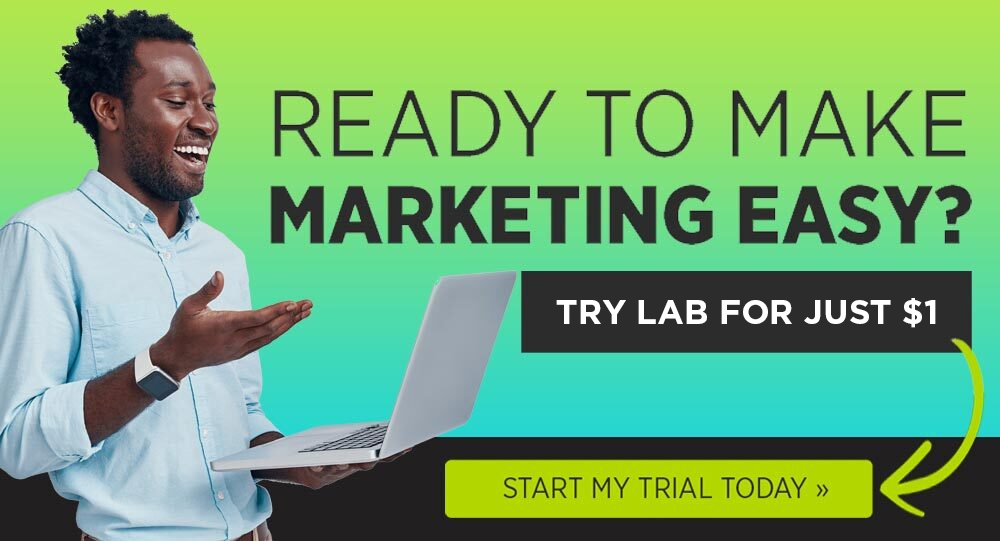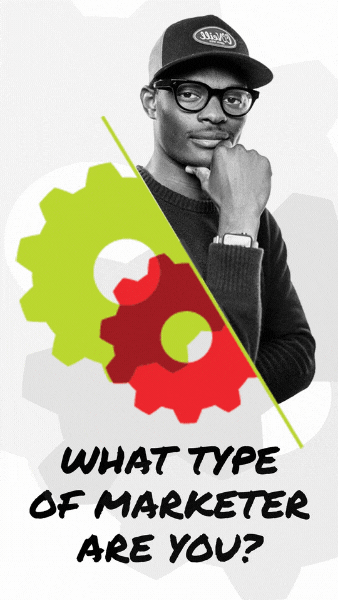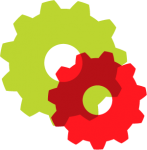

We’re assuming by the point that you’re reading this article, you’ve heard about a community creating traffic, conversions, and customer advocates for a product or business and you’re wondering—how do I do that?!
And we’re with you. We have our own Facebook group because we realized several years ago that creating a community was a huge value-add to our Lab members and our business.
Regardless of what type of community you’re trying to build, there is a 100% chance that you’ll be able to find the platform to host it. You can create communities on Facebook, Instagram, Patreon, your own membership platform, etc.
Our Facebook community has been able to foster incredible relationships between community members that have helped them nail their marketing strategies and business endeavors. We’ve also created an open line of communication between our members and us so we can always see what we could be doing to help them out more.
Using this experience, we’ve figured out there are 6 questions that every business owner needs to ask themselves before they invest time and resources into their online community.
Ask yourself these 6 questions to see if an online community is right for your business.
#1: Is a Community a Good Value-Add to Your Offer?
For some products and services, having a community is a huge value add to your current offer. For example, a one-time purchase YouTube coaching program can come with access to a Facebook group.
Sunny Lenarduzzi, creator of the Authority Accelerator program that helps her clients get sales on YouTube has a value-add of access to the Facebook group with purchase of the program.

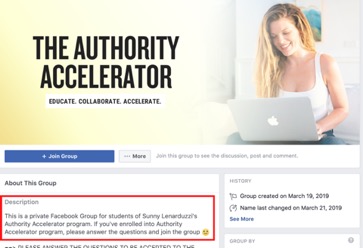
Using her community, she can showcase that her clients aren’t just getting a course that they have to figure out on their own—they’ll get access to Sunny and other Authority Accelerator members who can help with challenges or cheer them on when they need some motivation.
#2: Would Your Customers Benefit from Talking to Each Other?
For some products, bringing the community together creates even more success for customers. DigitalMarketer is the walking and talking example of this. Part of being a Lab member at DM means that you get access to our Facebook group, DigitalMarketer Engage.
This is where our members can get advice from each other, collaborate, and have their mastermind of savvy marketers, agency owners, and entrepreneurs who can offer help that’s backed by experience. By giving our members access to each other, we can foster those valuable relationships.


#3: Could You Use Your Community to Answer the Same Questions at Scale?
Using a community, you could help out a lot of people with only one message. For example, let’s say an online fitness trainer has their community on Instagram. They can answer the same question at scale, by publishing the answer to their community.
For example, Kayla Itsines uses Instagram as the main hub of the lead generation side of her community. Once someone buys her fitness app, Sweat, they’ll have a community inside of the Sweat platform. For now, we’ll focus on the Instagram community.
If Kayla keeps seeing that community members are interested to see what she eats for breakfast, instead of answering each person she can create a post that everyone will see.

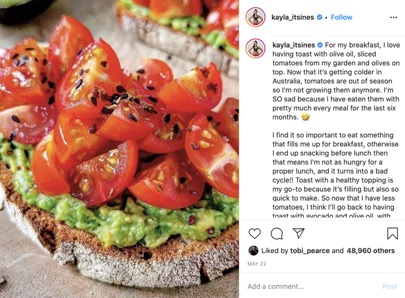
This helps her answer the same question at scale. If you’re finding that you’re constantly answering the same question but for different people, a community can create a space where you can answer those questions and then point people to the answer as the question keeps being asked.
#4: Is Your Community a Good Place to Host Events?
Using your community as your digital headquarters, you can host events inside of your community. These events can range from one day to one week, or longer depending on your incentive.
For example, if you’re about to come out with a book, you can start to host events around the topic of your book a few months before it’s published. Using the events, you can create excitement around your book launch and all of the juicy content inside. Another option is to go live and have conversations with your community members.
Rachel Hollis is a great example of this; she and her husband went live every weekday morning to foster a deeper relationship with their audience and to promote their products. They used Rachel’s Facebook page to go live, which meant that everyone watching could interact in the comments during the Start Today with Rach & Dave Morning Show.

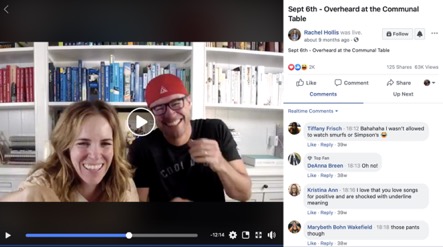
Rachel talked about how this was a huge part of her businesses success during her interview at the 2019 Traffic & Conversion Summit.
#5: Would Your Customers Want to Learn About New Products & Services in the Community?
Having a community gives your customers a place to learn more about your future products, new services, and epic offers. It’s like having the ultimate Facebook audience—but you don’t have to pay to run ads to them.
Using your community, you can tell them about new things that are coming their way. You can also create funnels that help excite them about the purchase (ahem, like the book example from above).
Another example is the email newsletter Trends, which has a value-add of a Facebook group community for all subscribers. When the founder, Sam Parr decided that he was going to launch a new product: The Ideation Bootcamp for $599, where was the first place he posted about it? Inside of the Trends.co Facebook community (he also created an email funnel for it).


If your customers love the current product or service they have from you, they’re going to be beyonddddd excited to have first dibs on the next projects that you’re rolling out.
If this could be of use to your business, you can consider creating a community that you can bring into the Excite stage of the Customer Value Journey, again and again.
#6: Does a Community Foster a Relationship Between You & Your Customers?
This is the ultimate question to ask yourself before starting a community. In the best-case scenario, could this community build a tighter relationship between yourself and your customers? If the answer is yes, you can pretty much green light your community now.
For example, members of our DigitalMarketer Engage get access to Ryan Deiss. When he can, Ryan can help them out with their questions (see below).

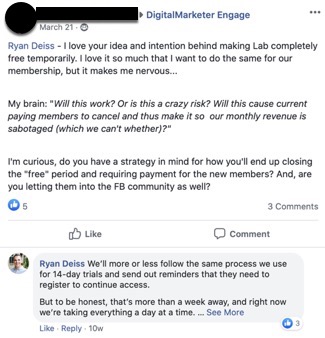
People want to buy things from other people they know. That’s why a huge part of marketing is getting over the Know, Like, and Trust factor. People don’t necessarily want to buy from complete strangers.
They want to feel like they know you through reading your content, following you on social media, having a friend refer them, and getting to talk to you directly in the community. The deeper you can create that relationship, the easier it will be in the future for you to get the traffic and conversions that you’re looking for.

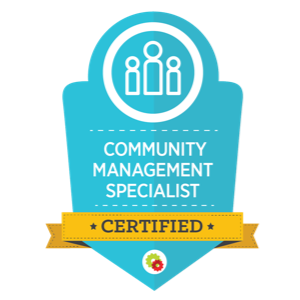
Become a Certified Community Specialist
Learn how to develop meaningful relationships with your customers and automate the customer acquisition process.
This also works two-fold. Your community will get to know you, and YOU will get to know your community. This means that the products and services you create for them are perfectly tailored for what THEY need and marketed exactly how they would need it to be.
Count that as Double Jeopardy.
Online communities are the place to connect your customers, scale your conversations, create a stronger relationship with your customers (or leads), and more. If you’re wondering if an online community is still for you—you can use Facebook groups to create a free community and test it out.
Just remember the golden rule of marketing: if there’s no value in it for your customers, they’re not going to be interested.
So make your community useful, value-driven, and exciting.
